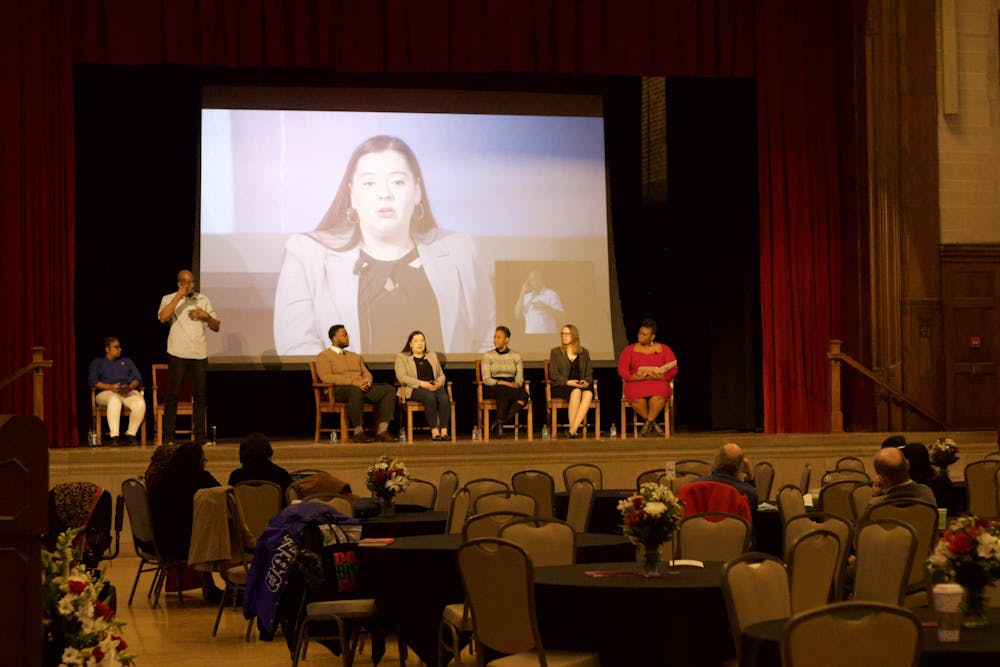For Thema Bryant, Martin Luther King Jr.’s dream is about so much more than the dream. It is about how we get there.
“We are not here to be observers of the dream, we are here to advocate and take our responsibility,” said Bryant, Pepperdine University’s director of Culture and Trauma Research.
Bryant spoke at Indiana University’s Martin Luther King Day celebration, which started at 8:30 p.m. Monday at Alumni Hall in the Indiana Memorial Union.
The event featured a continental breakfast followed by remarks from Bloomington leaders and advocates from all IU campuses. Presentations ended with a keynote address from Bryant.
The conference theme, audacity, came from Martin Luther King Jr.’s 1964 Nobel Peace Prize acceptance speech.
“I have the audacity to believe that people’s everywhere can have three meals a day for their bodies, education, and culture for their minds, and dignity, equality, and freedom for their spirits,” King said in his speech.
President Pamela Whitten pointed out the conference comes just days after an anti-Asian hate crime occurred in Bloomington, which she said calls for all the more audacity.
But what does “audacity” mean in regards to racism and trauma in 2023? Martin Luther King Jr. showed it during the civil rights movement by believing change is possible.
Thema Bryant, director of Culture and Trauma Research Lab at Pepperdine University, describes it as something we need to continue the progress within social justice. Audacity describes those who are willing to do the work, even though it's uncomfortable, she said.
“It requires that kind of audacity to, in the same week that we have seen a hate crime, show up and say ‘Yet, we believe’,” Bryant said. “It requires that kind of bodacious audacity to stand up in the midst of all of the despair and say ‘There is still reason for me to hope, there is still reason for me to believe, there is still reason for me to resist.’”
Bryant has studied trauma recovery for more than 20 years, often appearing on television as a mental health expert. She has dedicated her career to raising awareness about mental health issues, specifically how it relates to racial trauma.
One of the first steps in understanding these traumas, she says, is to realize that oppression occurs not just in the world, but also in our own backyards. Oppression can happen anywhere, even our own communities, schools, workplaces, etc.
“If we are committed to justice, we cannot get defensive when the light turns on our own campuses,” she said. “Those who are committed to deep-rooted change are willing to acknowledge we have grown, but there is still growth to accomplish.”
After informing the audience to challenge their own communities, Bryant encouraged Hoosiers to be present through accountability and monitoring, and to push the boundaries of “cultural competence.”
“Stretching beyond awareness is anti-oppression,” Bryant said. “How you are willing to work to change it in our policies and procedures on campus — that's what we want to know. I came on today looking for those who are willing to speak up.”
Acknowledgment is a big first step in racial traumas for everyone, she said.
Bryant continued to talk about the effects of racial trauma, both psychological and physical, prompting the audience to think about ways they have been affected by oppression. We all respond differently, but we all have a response, she said.
“Some of us respond with depression and despair, but as you think about people of color I want you to know that culturally and religiously many of us are raised to not show weakness,” Bryant said. “So sometimes our depression doesn’t show up as sadness, it shows up as irritability.”
This response is a result of trauma, Bryant said, some people may react with irritability because their life has required it, not because they are rude or mean. Many people have adjusted to racism, which calls for unity of people from every background to dismantle, she said.
“We are one family and no one can separate us,” Bryant said to the crowd.
After, she had everyone in the room repeat to those standing them to them.
The event concluded with closing remarks from Monica Johnson, Assistant Vice President of the Diversity Education and Cross-Cultural Engagement program.




